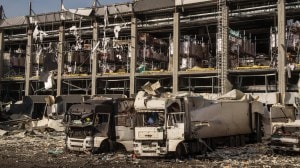Dirt settles again on Calcutta
The ancient Chapel Church near Writer's building (state government secretariat) completely blocked out from view by a huge hoarding of Crom...

The ancient Chapel Church near Writer’s building (state government secretariat) completely blocked out from view by a huge hoarding of Crompton fans.
CALCUTTA, May 5: It used to be described as India’s Black Hole by the British in the 18the Century, when the industrial revolution was at its peak in that country.
Patriotic Indians would turn stiff with injured pride at this description, but as most people are aware, Calcutta has had the misfortune of being branded as India’s dirtiest city.
Things began to change about six months ago, just before British Prime Minister John Major was due to visit the city. In a rapid-fire campaign, the civic administration and West Bengal government evicted hundreds of hawkers and roadside shopowners entrenched in several prestigious neighbourhoods.
Now, even as the pavements are crowded with petty shopkeepers once again, the administration is engaged in a high profile effort against illegal hoardings and publicity posters, ostensibly to give the city a new image in the eyes of the world. The earlier campaign sent the city’s crime graph spiralling upwards but earned it a cover story in Newsweek; with the latest round, Calcutta civic chief Ashim Burman might perhaps make it to the cover of Time magazine.
According to leading members of the Indian Chamber of Commerce and Industry, the West Bengal government displays the Newsweek article at every available opportunity in a desperate attempt to convince Western businessmen that it is worthwhile to invest their capital in the state. This in fact betrays the real purpose behind the campaigns, the ICCI official says.
His drive against the massive hoardings, which dot the landscape, is going to reach its highest pitch on Saturday, under heavy police bandobast, a highly placed municipal official told The Indian Express. As an offshoot of these campaigns, the cops in some areas like Dacres Lane near Esplanade, have allegedly started demanding more protection money than before, from roadside eating shops which they themselves used to patronise.
But Burman knows that the toughest task before his team will be to solve the problem of garbage disposal, since he has only half of the 160 trucks that he needs. Private contractors make up the deficit but each private lorry makes only two trips per day, while about four to five trips a day are required if they are to clear up all the waste material generated per day.
Hence, when Mr S R Rao, the municipal commissioner of Surat during its miraculous clean up, was visiting Calcutta in March, and reporters wanted to know if the Surat experiment could be duplicated here, Burman carefully avoided committing himself.
Burman is also up against the deeply ingrained habit of Calcutta’s denizens of dropping crushed paper bags, chocolate wrappers, plastic glasses and used bus tickets on the road, with nary a passing thought about who will clear the mess they create.



- 0118 hours ago
- 021 day ago
- 031 day ago
- 0417 hours ago
- 051 day ago




























